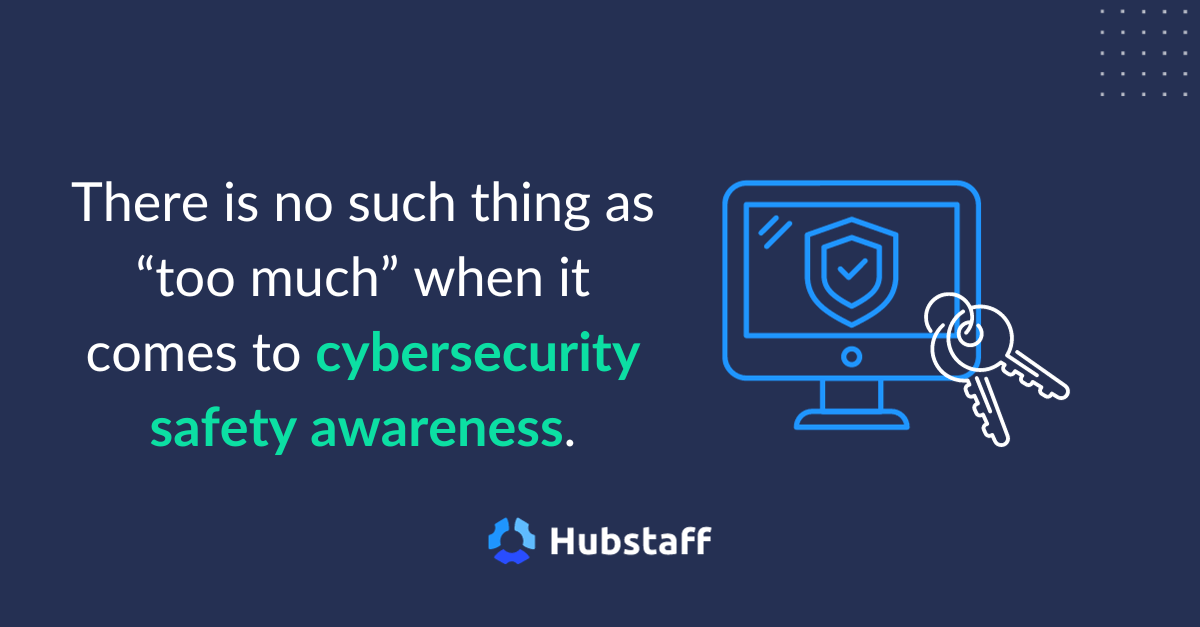Navigating remote work legal considerations is a necessary evil that enables all the benefits we’ve come to love about remote and hybrid work. Luckily, we’re experts in the remote workspace, here to guide you through everything you need to know.
Hubstaff has been operating 100% remotely since 2012. In over a decade of remote work, we’ve learned a lot about how a remote business runs. We’ve made mistakes, learned lessons, and are ready to share some hard-earned expertise.
Remote work is here to stay: By 2025, an estimated 32.6 million Americans will be working remotely, about 22% of the workforce. With the continued interest in remote work, employers must grasp the intricacies of remote work legal considerations to create policies that align with regulations.
The stakes are high: When employers neglect legal requirements for remote workers, they risk legal repercussions and potential liabilities. Compliance isn’t just a checkbox — it’s the backbone of a secure and harmonious remote work environment.
This guide delves into the intricacies of remote work’s legal landscape, uncovering the essential information employers and employees need.
Boost your team’s efficiency with Hubstaff's productivity tools
Remote work legal issues: an overview
Employers venturing into remote work must navigate various legal considerations to foster a compliant and supportive work environment.

Here’s the biggest thing we’ll clue you in on: hiring remote workers doesn’t exempt employers from fulfilling their responsibilities to comply with employment laws. In reality, remote work puts more pressure on leaders to track their team’s hours and ensure they uphold legal requirements.
The United States has a series of laws and regulations that employers need to know if they hire workers in the US. As with in-office workers, employers must also ensure that their remote work policies comply with state and federal labor laws such as:
- The Fair Labor Standards Act (FLSA): The FLSA establishes minimum wage, overtime pay eligibility, recordkeeping, and child labor standards to ensure fair labor practices and protect workers’ rights in the United States.
- The Family and Medical Leave Act (FMLA): The FMLA provides eligible employees with job-protected leave for specific family or medical reasons.
- Americans with Disabilities Act (ADA): The ADA prohibits discrimination against individuals with disabilities in various aspects of public life, including employment. It requires employers to provide reasonable accommodations to qualified individuals with disabilities to ensure equal opportunities in the workplace.
- Worker’s compensation: Worker’s compensation ensures that employees are financially protected in case of work-related injuries or illnesses. It provides medical benefits and compensation for lost wages during recovery.
Remote work issues for employers
Employers have several obligations in remote work arrangements that can impact the legal implications of remote work policies. We’re not legal experts, but we’ll include links to sources whenever possible and some actionable steps employers can take to safeguard themselves against legal consequences.
Wage and hour compliance
Wage and hour compliance in a remote work setup involves ensuring that each remote employee is compensated fairly and that accurate records of their working hours are maintained. Employers should also implement time tracking tools to monitor hours worked, provide clear guidelines on expected work hours, and establish policies for overtime.
Communicating these expectations helps maintain legal compliance, fosters transparency, and ensures employees receive proper compensation for their efforts.
Steps employers should take to avoid wage and hour issues:
- Use secure communication channels and encrypt sensitive data
- Educate employees on best practices for maintaining data security
- Adhere to data protection laws like GDPR or HIPAA as applicable
- Establish policies for overtime and communicate expectations for when employees work
- Abide by wage and hour laws
- Safeguard sensitive information to ensure legal compliance
Tax implications
The tax landscape can become complicated when managing a remote workforce. Employers must be aware of employee residency issues, varying state tax regulations, and other stipulations that can affect the way their employees pay taxes. It’s crucial to consult with tax professionals specializing in remote work scenarios to navigate these complexities successfully.
Understanding withholding requirements, staying informed about tax credits related to remote work, and incorporating this knowledge into financial planning are essential for legal compliance and effective tax management.
Steps employers should take:
- Consult with tax professionals for expert advice
- Understand employee residency issues and state income tax regulations
- Stay informed about tax credits related to remote work
- Incorporate tax considerations into financial planning
Employment contracts
Crafting employment contracts for remote workers is critical for establishing a clear employer-employee relationship. These contracts should also outline job responsibilities, performance expectations, and communication protocols specific to remote work.
Periodic reviews and updates to remote employment contracts ensure they remain relevant to the evolving nature of remote work.
Steps employers should take:
- Clearly outline job responsibilities and performance expectations
- Establish communication protocols specific to remote work
- Include clauses on confidentiality, data protection, and dispute resolution
- Periodically review and update contracts to reflect remote work changes

Data security and privacy
With remote work, the potential for data security and privacy breaches increases. Employers must implement comprehensive measures to protect sensitive information. This also includes using secure communication channels, encrypting data, and educating employees on best practices for maintaining data security.
Adhering to data protection laws and regulations, such as GDPR or HIPAA (depending on the nature of the business), is crucial for legal compliance and safeguarding the organization and its employees.
Steps employers should take:
- Use secure communication channels and encrypt sensitive data
- Educate employees on best practices for maintaining data security
- Adhere to data protection laws like GDPR or HIPAA as applicable
- Safeguard sensitive information to ensure legal compliance
Occupational health and safety
Ensuring a safe working environment for remote employees involves addressing physical and mental well-being. Employers can do this by providing guidelines on setting up ergonomic home offices, encourage regular breaks, and promote practices that support mental health.
Establishing channels for employees to report safety concerns and providing resources for occupational health and safety also contributes to legal compliance and creates a positive remote work experience.
Steps employers should take:
- Provide guidelines for setting up ergonomic home offices
- Encourage regular breaks to support physical and mental well-being
- Establish channels for reporting safety concerns
- Offer resources for occupational health and safety
Intellectual property rights
Remote work necessitates a clear understanding of intellectual property (IP) rights to avoid disputes and protect the organization’s creative assets. Employers should educate remote workers on the company’s IP policies and specify ownership and usage permissions.
Including clauses in employment contracts that address IP rights, confidentiality obligations, and the handling of proprietary information establishes a legal framework that safeguards the organization’s innovative efforts and mitigates the risk of IP-related disputes.
Steps employers should take:
- Educate remote workers on the company’s IP policies
- Specify ownership and permitted usage of creative assets
- Include clauses in employment contracts addressing IP rights
- Conduct periodic training on IP matters for reinforcement and awareness
Remote work issues for employees
Working from home comes with its own set of legal considerations for remote workers, like keeping data safe and following confidentiality rules.
Generally, remote employees should stick to the rules in their company’s remote work policy. It’s also important to know your rights and the legal protections for workers in your location.
- Wage and hour concerns: As a remote worker, it’s crucial to understand your rights regarding compensation. That includes overtime pay, breaks, and accurate recording of work hours to ensure fair and legal employment.
- Tax implications: Depending on location, remote employees may face tax challenges. It’s essential to be aware of tax regulations, ensure proper withholding, and comply with tax laws to avoid issues with authorities.
- Understanding employment classification: As a remote worker, it’s crucial to correctly classify each member of your team as an employee or contractor. While these classifications seem harmless at a glance, they can have a considerable impact on benefits, labor rights, and tax obligations.
- Navigating global employment laws: If you work remotely in different jurisdictions, you must know the employment laws in each location. This helps you understand your rights and the legal framework that governs your remote work arrangement. Remote workers must make sure that their remote work arrangements comply with the state regulations where they are located.
Resources for employees
- Workers in the US: check out this guide to State labor laws. Also, employees in the US should know their rights and entitlements under the Fair Labor Standards Act (FLSA), FMLA, and other labor laws included above.
- Workers in Canada: The Canadian rights in the workplace guide can help anyone in Canada figure out their rights.
- Workers in Europe: Read this guide to European Labour law – Employment, Social Affairs & Inclusion.
Out-of-state remote work policy
Common mistake alert: Many companies in the US forget to keep tabs on where their remote team is working, which can lead to serious legal headaches.

Key considerations for out-of-state remote workers:
- State and local compliance: Employers must be well-versed in state and local regulations, encompassing tax laws and worker’s compensation requirements. Check out our article on out-of-state employee taxes.
- Policy alignment: Ensuring the remote work policy aligns with state and local labor laws is paramount.
- Cost implications: Employers should consider the costs associated with adhering to diverse legal requirements when hiring employees in different states.
Our key advice? Consult an expert. You’re already doing your due diligence by searching and reading about remote work laws, but you shouldn’t try and handle it alone. Lawyers who know the ins and outs of employment laws in that state should be your next point of contact.
Key takeaways on remote work legal considerations
As remote work continues to gain traction, employers must wrap their heads around the ins and outs of legal considerations. This way, they can craft policies that adhere to regulations and fit seamlessly with the ever-changing remote work landscape.
Remote work legal considerations are crucial: Employers should develop and implement clear remote work policies that comply with state and federal laws. Don’t be afraid to get help. Consulting a legal expert can save you time and money down the road.
Employees have responsibilities, too: remote team members should comply with internal policies to avoid potential legal implications concerning data privacy, confidentiality, and intellectual property rights. Be savvy and research your rights before agreeing to a remote position.
Let’s empower your remote endeavors with knowledge and ensure that the future of work is not just flexible but legally sound.
Important Notice: The information in this article is general in nature and you should consider whether the information is appropriate to your needs. Legal and other matters referred to in this article are of a general nature only and are based on Hubstaff’s interpretation of laws existing at the time and should not be relied on in place of professional advice.
Hubstaff is not responsible for the content of any site owned by a third party that may be linked to this article and no warranty is made by us concerning the suitability, accuracy or timeliness of the content of any site that may be linked to this article. Hubstaff disclaims all liability (except for any liability which by law cannot be excluded) for any error, inaccuracy, or omission from the information contained in this article and any loss or damage suffered by any person directly or indirectly through relying on this information.
Most popular
The Fundamentals of Employee Goal Setting
Employee goal setting is crucial for reaching broader business goals, but a lot of us struggle to know where to start. American...
Data-Driven Productivity with Hubstaff Insights: Webinar Recap
In our recent webinar, the product team provided a deep overview of the Hubstaff Insights add-on, a powerful productivity measurem...
The Critical Role of Employee Monitoring and Workplace Security
Why do we need employee monitoring and workplace security? Companies had to adapt fast when the world shifted to remote work...
15 Ways to Use AI in the Workforce
Whether through AI-powered project management, strategic planning, or simply automating simple admin work, we’ve seen a dramatic...




